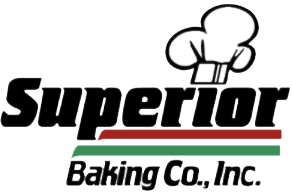FAQs
The following FAQs are provided for general information about the baking industry and may not reflect the specific products, processes, or policies of Superior Baking Co. For questions related directly to Superior Baking Co., please call (508) 586-6601.
What are the best types of bread for restaurants to serve with soups, sandwiches, and entrées?
Restaurants often choose breads that complement their menu. Artisan breads, sandwich loaves, and hearty rolls work well with soups, salads, and main dishes. Hearth-baked breads with a crisp crust and soft interior are popular for table service, while sandwich breads are ideal for high-volume kitchens.
What’s the difference between artisan bread and traditional sandwich bread in wholesale baking?
Artisan bread is usually handcrafted, with longer fermentation, rustic textures, and complex flavors. Traditional sandwich bread is softer, uniform, and designed for consistency in sandwiches and high-volume service. Restaurants often use both to balance quality and operational needs.
How do I choose a reliable wholesale bakery for my restaurant or café?
Look for bakeries with consistent quality, reliable delivery schedules, flexible order sizes, and experience serving food service clients. Reviews, regional reputation, and the variety of breads offered are also important considerations.
What are the most popular rolls and sandwich breads used in food service?
Classic dinner rolls, brioche buns, ciabatta rolls, and soft sandwich loaves are top sellers. These breads are versatile, easy to store, and pair well with a wide range of dishes.
What makes hearth-baked bread different from other commercial breads?
Hearth-baked bread is baked directly on the oven floor or stone, creating a thicker crust and moist interior. This method enhances flavor and texture, offering a premium option for restaurants that want a distinctive bread experience.
How do wholesale bakeries package and deliver bread to restaurants and distributors?
Wholesale bakeries typically use eco-friendly packaging to maintain freshness and prevent damage during transit. Daily or scheduled deliveries ensure bread arrives fresh, ready to serve, and within the bakery’s shelf-life standards.
What are typical minimum order quantities for wholesale baked goods?
Minimums vary by bakery and product type but often range from one case per bread variety. Flexible bakeries may accommodate smaller or trial orders for new clients, making it easier for restaurants to test products.
How do I find a regional wholesale bakery that delivers fresh bread daily?
Search for bakeries in your region with established food service programs. Ask about delivery schedules, product variety, and whether they specialize in daily fresh deliveries to ensure consistent quality.
What should I look for when comparing wholesale bread suppliers?
Consider product variety, quality, ingredient sourcing, delivery reliability, and responsiveness. Bakeries that understand food service operations and offer menu-friendly solutions are ideal partners.
What’s the average shelf life of freshly baked bread in food service distribution?
Freshly baked bread usually lasts 2–5 days at room temperature, depending on type and ingredients. Some bakeries offer slightly longer shelf-life breads without preservatives, ideal for restaurants needing flexible ordering schedules.
Why do restaurants prefer bakeries that use premium or locally sourced ingredients?
Premium ingredients and local sourcing improve flavor, freshness, and customer perception. Many restaurants market these qualities to emphasize quality and support for local businesses.
How do commercial bakeries maintain consistency in large-scale bread production?
Through precise recipes, controlled fermentation, quality ingredient sourcing, and professional baking techniques. Reliable bakeries also perform routine quality checks before delivery to food service clients.
Are there benefits to sourcing bread from a family-owned bakery vs. a national brand?
Family-owned bakeries often provide personalized service, flexible order sizes, and customized products. They can respond quickly to menu changes, maintain high-quality standards, and build long-term relationships with restaurants.
What types of flour or baking methods make artisan bread higher quality?
High-protein flours, long fermentation, slow proofing, and hearth or stone baking contribute to superior texture, flavor, and shelf-life. These methods create breads that stand out on the menu and elevate the dining experience.
Are there clean-label or preservative-free wholesale bread options available?
Yes. Many wholesale bakeries offer breads made with simple, natural ingredients without artificial additives. These options appeal to restaurants and food service providers focused on health-conscious menus.
16. What bread varieties work best for high-volume sandwich programs?
Soft sandwich loaves, hoagie rolls, brioche buns, and pull-apart rolls are excellent for high-volume kitchens. They hold fillings well, slice consistently, and maintain freshness over multiple service periods.
How can restaurants or food service buyers customize bread or roll sizes for their menu?
Many bakeries offer custom sizing, specialty shapes, and portion-controlled breads to match menu requirements. Customization allows restaurants to reduce waste and create signature menu items.
What seasonal or specialty loaves can restaurants feature to stand out?
Bakeries often produce seasonal breads like pumpkin, cranberry, multigrain, and specialty artisan loaves. These items help restaurants refresh menus and offer unique dining experiences.
How do I calculate bread usage or cost per serving for my menu?
Start with standard portion sizes, then multiply by daily servings. Factor in waste and shelf-life. Wholesale bakeries can provide guidance on yield per loaf and cost per portion to simplify menu planning.
What trends are shaping the wholesale baking industry for restaurants and distributors?
Current trends include artisan-style breads, clean-label and preservative-free products, locally sourced ingredients, and menu-specific customization. Restaurants are also seeking sustainable packaging and reliable delivery solutions.
